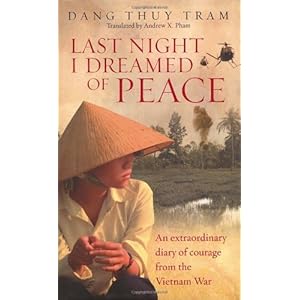Original Title in Vietnamese: Nhật ký Đặng Thùy Trâm
Available in Vietnamese e-book version.
Diary by Author in Vietnamese. 225 pp.
Translated by Andrew X. Pham; Introduction by Frances Fitzgerald.
About the book:
Tram, a doctor sent south from Hanoi to work in a hospital in Quang Ngai, was killed by US troops 6/22/70. Her diary, captured by the US troops, covering 1968-70, ended up in the Vietnam Archive at Texas Tech University. A copy was eventually sent to Hanoi, where it was published as Nhat ky Dang Thuy Tram (Hanoi: Nha Xuat Ban Hoi Nha Van, 2005) and attracted a lot of attention. There was a forum on this book in the Journal of Vietnamese Studies, vol. 3 no. 2 (Summer 2008), pp. 172-221. The essay I found most interesting was Vuong Tri Nhan, "The Diary of Dang Thuy Tram and the Postwar Vietnamese Mentality" (pp. 180-195).
Random House's note to Teachers:
This book is unique among the thousands of personal accounts by US veterans of what Americans call the Vietnam War, the dozens of accounts written by former members of the South Vietnamese Army (ARVN), and the handful of accounts available in English from
what we once called North Vietnam (DRV). In contrast to most US and ARVN accounts, it offers a voice from “the other side”—yet a voice so universal that ARVN and US soldiers both felt it should be preserved. In contrast to most northern accounts, it gives voice to the immediate, day-to-day experiences of war, chronicled by a young woman working as a civilian doctor on the front lines.
The best-known accounts we have to date were written retrospectively, with post-war hindsight, using the tools of fiction and history to explore suffering, physical and psychic wounds, and disillusionment. Such works include: Tim O’Brien’s The Things They Carried, for example, or Michael Herr’s Dispatches, Bao Ninh’s Sorrow of War, Duong Thu Huong’s Novel Without a Name, Nguyen Qui Duc’s Where the Ashes Are or Quang X. Pham’s A Sense of Duty. These works were written to be read by others.
Dang Thuy Tram was writing for herself, and from the midst of war. Hers is a voice of youth, optimism and idealism recorded in diary entries that were never intended to be read by Americans. Students will be fascinated by these diaries on many levels: as an introduction to the day-to-day experiences of war written by a civilian young woman whom students can imagine as a peer; as an insight into the motivations of someone who looked at joining the communist party of Vietnam as an honor to be won; as an inspiration for reflecting on how to live.
At the start of Last Night I Dreamed of Peace, the war is present mainly in the wounds of the soldiers Dr. Tram cares for, and in her patriotic sentiments. As the diary progresses, war takes a larger and larger place as sorrow and matters of survival dampen but do not extinguish thoughts of love, affection, and a desire to lead an exemplary life. Note: It is helpful to encourage students to reflect on the differences between a diary and a work of fiction in order to prepare them for more repetition than a novel and less plot, less resolution.
About the Author:
The moving story of the life, work, and death of DANG THUY TRAM is well told in the
introduction to Last Night I Dreamed of Peace, as is the remarkable story of the diaries
themselves: their rescue from destruction, their preservation, their return after 35 years to
Dang Thuy Tram’s family, and the intense public interest they aroused in Vietnam.
Here I will add only a post-script on Thuy Tram’s death, gleaned from the introduction to
the Vietnamese publication of the diaries. People of the region buried her where she fell, and
lit incense in memory and respect. After the end of the war, her remains were taken to the
martyrs’ cemetery in nearby Pho Cuong. In 1990 her family brought her remains back to the
martyrs’ cemetery in Xuan Phuong village of Tu Liem district near Hanoi.
A clinic honoring Dr. Tram was opened in Pho Cuong in December of 2006, supported by local and foreign individuals and organizations.
Historical Background
The introduction to Last Night I Dreamed of Peace traces the historical, military, and geographic settings for the diaries. Here I will sketch some of the elements of the view of history that was likely to have motivated Dang Thuy Tram, basing my reconstruction on her writing and on conversations with her contemporaries from Hanoi. It is a view that may challenge, or perhaps reaffirm, the views of readers who think of the Vietnamese/American war in Cold War terms. At the end of this section you’ll find a short bibliography for further reading in history. A selection of other memoirs may be found at the end of this study guide, under “Other Titles of Interest”. Download pdf
(Source: Random House)
